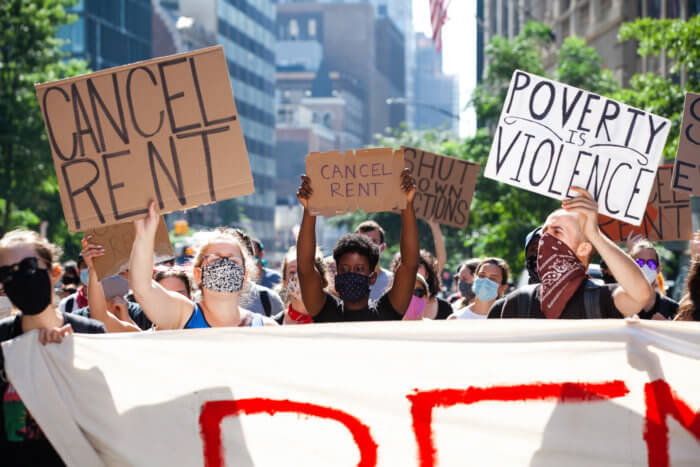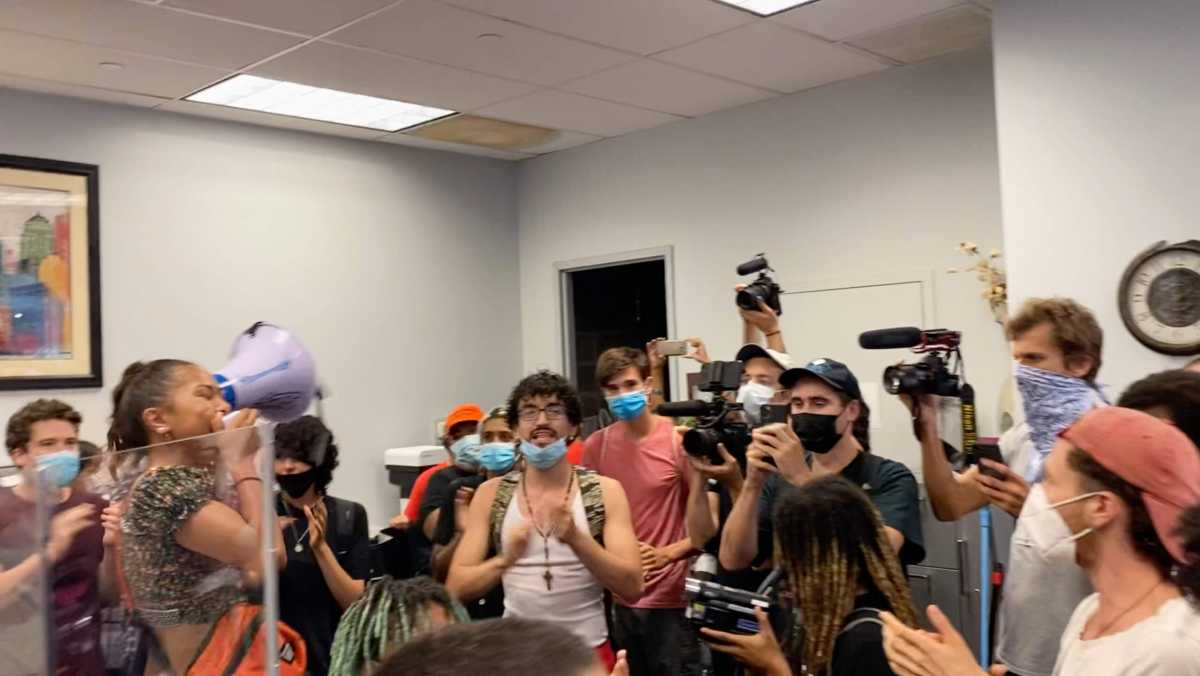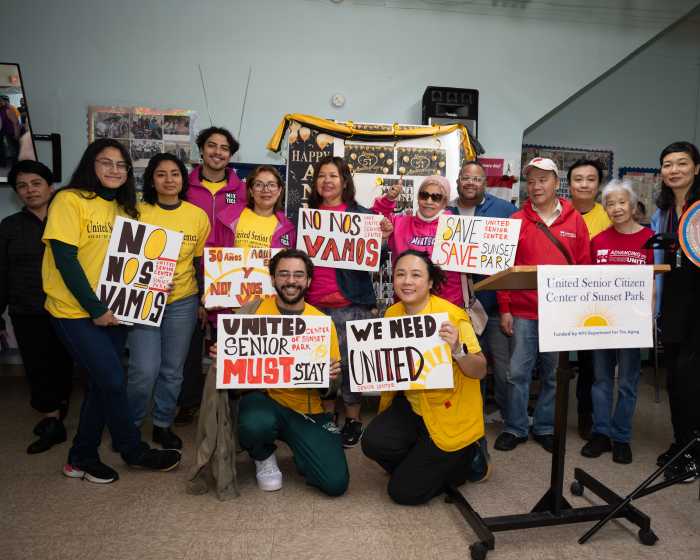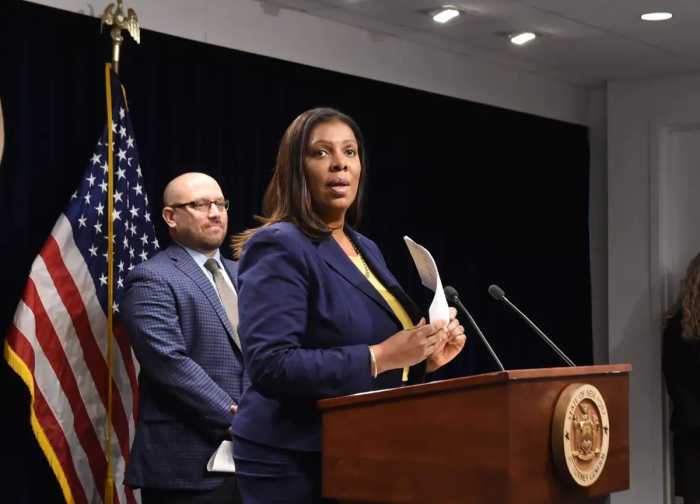Dozens of activists stormed a Downtown Brooklyn law office on Thursday morning during a protest calling on the state to halt a pending wave of evictions stemming from the COVID-19 pandemic.
“No landlords. No cops. All evictions gotta stop,” chanted the nearly four dozen demonstrators inside the lobby of real estate attorneys Balsamo, Rosenblatt, and Hall.
The rally came one day after Gov. Andrew Cuomo issued an executive order Wednesday night giving New York’s Office of Court Administration leeway to extend the state’s eviction moratorium through Sept. 4 — but one tenant activist said those measures failed to give tenants proper reassurance, and that the state needs to go beyond short-term fixes.
“We refuse to accept a month, we refuse to accept half measures,” said Ali, an organizer with the Bushwick Bed-Stuy Tenants Coalition who declined to give his last name. “They think we’re going to be satisfied, they think we’re going to get tired, they think the news is going to get tired of reporting it. But we are not backing down — if anything, we are going to escalate if they do not back down themselves.”
During the morning’s demonstration at the law firm’s Schermerhorn Street headquarters, attorneys and staff mostly milled about in their overcrowded office.
One legal eagle later reached out by phone to say the protesters’ anger was misdirected — and argued that half of their work is on behalf of tenants facing evictions.
“Besides the Legal Aid offices, there’s not a bigger law firm in Brooklyn that serves tenants,” said Robert Rosenblatt, a partner with the company. “Half of my calendar is tenant work that we’re working with clients to prevent evictions.”
The attorney conceded that the other 50 percent of their workload is for landlords, including eviction cases, before denouncing the protesters’ tactics — saying the crowd intimidated his staff, vandalized desks and walls with sharpies, poured water on documents, and stole postage and notary stamps.
“I’m in support of the movement but this is not the way to protest, to be violent and to do misdemeanors. If they came in and asked for a dialogue, I would have shown them the thousands of thousands of tenants I’ve represented,” he said. “As the great [civil rights leader] John Lewis once said, ‘protest, but do it peacefully.'”
https://twitter.com/kduggan16/status/1291384663571927044?ref_src=twsrc%5Etfw%7Ctwcamp%5Etweetembed%7Ctwterm%5E1291385302930653185%7Ctwgr%5E&ref_url=https%3A%2F%2Fwww.brooklynpaper.com%2F%3Fp%3D141358preview%3Dtruepreview_id%3D141358
The rally marked the third straight day of protests that originated outside the housing court building on Livingston Street, organized by groups like the Crown Heights Tenant Union and Full Time Tenant Union, demanding Governor Andrew Cuomo cancel rent as thousands of New Yorkers are at risk of eviction.
The previous day, protesters gathered inside two Court Street law firms, before blowing past security guards and into Borough Hall across the street.
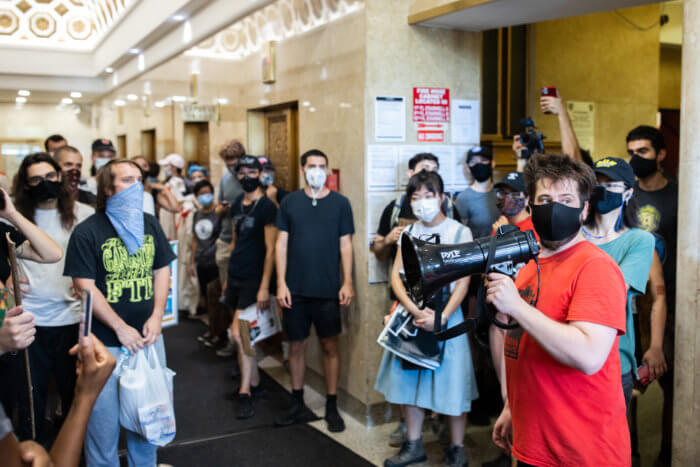
One protester at Thursday’s rally, who has been out of work since the pandemic began, said that she and many other tenants around the borough fear losing a roof over their head now that federal government’s $600 boost in unemployment benefits expired on Aug. 5, leaving out-of-work people even more cash-strapped and unable to pay rent.
“If I don’t have the means to pay for [rent], what happens next,” said Starr Sanford, a Bushwick video technician. “Will I be evicted? Will I be forcibly removed if I’m unable to pay? It’s a lot of fear.”
The state’s housing court system is now reviewing Cuomo’s recent executive order to determine whether they will extend the moratorium on eviction cases, with further clarity expected within the coming days.
Meanwhile the governor signed the “Tenant Safe Harbor Act” in June, giving tenants who have “suffered a financial hardship during the COVID-19 covered period” a legal remedy to protect against evictions if they have failed to pay rent during the pandemic — although critics have charged that the law is too vague about how tenants can prove that they’ve suffered from coronavirus-related financial burden.
